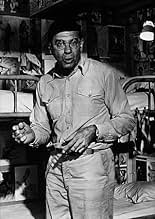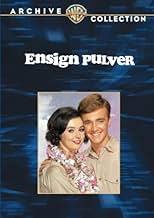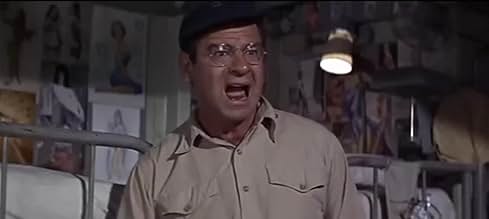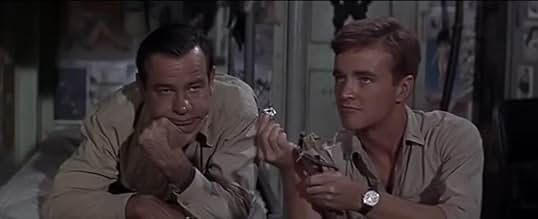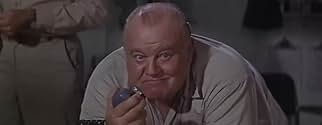1945, ein Army-Frachter im Pazifik: Als der verhasste Kapitän über Bord fällt, rettet ihm Fähnrich Pulver gegen seine eigene Überzeugung das Leben, aber die beiden werden auf dem Rettungsflo... Alles lesen1945, ein Army-Frachter im Pazifik: Als der verhasste Kapitän über Bord fällt, rettet ihm Fähnrich Pulver gegen seine eigene Überzeugung das Leben, aber die beiden werden auf dem Rettungsfloß abgetrieben, und der Kapitän ist schwerkrank.1945, ein Army-Frachter im Pazifik: Als der verhasste Kapitän über Bord fällt, rettet ihm Fähnrich Pulver gegen seine eigene Überzeugung das Leben, aber die beiden werden auf dem Rettungsfloß abgetrieben, und der Kapitän ist schwerkrank.
- Ensign Frank Pulver
- (as Robert Walker)
- Carney
- (as Peter L. Marshall)
- LaSueur
- (as Gerald O'Loughlin)
- Stefanowski
- (as Richard Gautier)
Empfohlene Bewertungen
This movie is worth watching in our current era first with an understanding of what it meant to be at the time; a mildly distracting 90 minutes of celluloid. It's not bad really.
Second, the movie is worth watching by students of film/culture to note how moral ambiguity influenced 1960's Hollywood. In 'Mr. Roberts' Cagney has a great scene about why he hates 'college boys' yet there's nothing in the film that treats his character with sympathy.
In 'Ensign Pulver' it seems pains are taken to give the Captain a back story so he comes across as a scarred victim of an unfortunate childhood.
The setting here is the same as in the earlier classic -- a scroungy old Navy vessel on the fringes of the Pacific Theater late in World War II. This movie is built around Ensign Frank Pulver, the sidekick of Mister Roberts in the original movie. Unfortunately, Robert Walker Jr., who plays Pulver here, can't match the original screen Pulver, Jack Lemmon. It's almost like they're playing different people.
That's the main problem, I think, too much tinkering with familiar characters. The focus of "Mister Roberts" was the battle of wits and wills between the idealistic Roberts (Henry Fonda) and the embittered captain (James Cagney). But in this film, the captain (now played by Burl Ives) finds himself psychoanalyzed by Pulver. Cagney's captain was hard to like but easy to understand, while Ives' version is as complicated as a Tennessee Williams character.
And how about Doc? In "Mister Roberts," he was portrayed by an older actor, William Powell, in one of his last roles. A counterpoint to the captain, Doc was a man who had grown wise, not cynical, with age. Walter Matthau, though a fine actor, is a much younger Doc in this one, and one who's not particularly wise. He's just another madcap guy in a madcap crew.
"Mister Roberts" had a lot of wonderful laughs, but ultimately it was dead serious about World War II. If you've seen it, you know what I mean. But in "Ensign Pulver," the greatest conflict in history is just an excuse for humdrum hijinks. It's really too bad.
Wusstest du schon
- WissenswertesMany scenes featuring Jack Nicholson were left on the cutting room floor.
- PatzerAfter Burl Ives falls overboard, Ensign Pulver releases a rubber raft to assist in the Captain's rescue. When the raft falls into the water, it obviously falls upside down, however, in the next shot it appears that the raft is upright and all of the equipment is still aboard.
- Zitate
Sailor: [Ensign Pulver is smuggling liquor aboard in a case marked "Brassieres"] Are bras that heavy, Mister Pulver?
Ens. Frank Pulver: Only when they're full.
- VerbindungenFeatures Der wandelnde Leichnam (1936)
- SoundtracksWhat Shall We do with a Drunken Sailor
(uncredited)
Traditional
Sung, with modified lyrics, by the crew just after the opening credits
Top-Auswahl
- How long is Ensign Pulver?Powered by Alexa
Details
Box Office
- Bruttoertrag in den USA und Kanada
- 2.616.000 $




